UCAT Preparation Course
Matrix UCAT Courses are designed to teach you the theory and exam techniques to acing the UCAT test.
Learning methods available
Select a year to see available courses
Got a looming exam? Afrina takes the stress out of exam prep as she shares exactly what you need to do to feel confident for your next exam. That includes tips on planning out your time, taking effective notes and dealing with past failures.

Join 75,893 students who already have a head start.
"*" indicates required fields
Do exams freak you out? Do you get anxious studying for them and more anxious sitting them? Well, in this article, Matrix Scholarship student Afrina shares how she takes the stress out of exam prep so she can perform her best on exam day!
In this article, Afrina discusses:
Name: Afrina Tanisha
School: St George Girls High School
Grade: Year 10 (2021)
University goal: Bachelor of Medical Studies/ Doctor of Medicine
Afrina Tanisha. Ambition and happiness, that’s me in two words, from the meaning of my names at least. I’m currently a Year 10 student at St George Girls High School.
My interests include poetry, reading, sports, photography, gardening and my new love for jigsaw puzzles. I’m an expressive person and find it quite calming to write my emotions out. Poetry would definitely be one of my favourite ways to portray my feelings. They are an underappreciated form of art. I like looking at the world from a structural point of view, how different vectors join together to create cohesion, and photography is the best way to capture that.
In the narrative I live in, I am an empathetic person and am often the person my friends come to for advice. I’m always ready with a smile and the shoulder to cry on. I am also ambitious, and I like working towards goals. Often, I like resonating with Lady Macbeth, but just a less intense version of that.
The subjects that I will be taking in Year 11 are:
If proper time management isn’t put into place, studying can become difficult throughout the term. It requires a lot of attention to balance time between tests, homework, note-taking and Matrix. Our routines can be seen on three different levels: the whole term routine, a weekly routine and a daily routine. However, I have it in mind that time is not flexible and I have to be able to adjust my routine when life hits. Having structure gives me a bit of control over how I am going to handle tasks and allows me to feel like I know what I’m doing.
Before I get into any routine, I make sure that my end goals can be achieved. I constantly make adjustments to my routine so I can realistically and successfully manoeuvre through the changes in my life. Having the end goal as my incentive propels the notion of sticking to the routine (since procrastination likes to visit a lot).
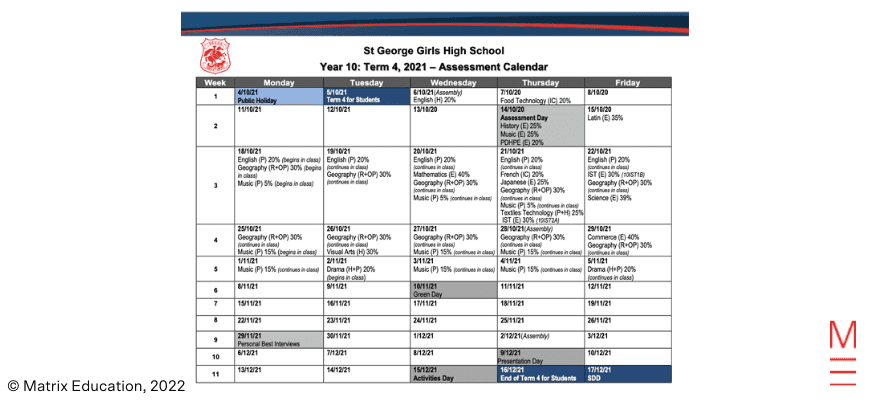
On a term scale, I usually plan out my routine so that my end goal is to do well in exams. I make extensive notes throughout the term for each of my subjects and properly space the time out to incorporate the note-making and the exam preparation. I get a term timetable of when all my exams happen, and use that as a base for the routine for the whole term. On that calendar I put in the days I have Matrix, any extracurriculars and any other important days e.g. excursions, camp, religious festivals etc. Looking at the bigger picture allows me to track projects that I need to get done, and analyse the space between significant dates.
I mainly work around daily routines rather than weekly routines. I have goals I want to achieve by the end of the week, and incorporate time for each task into my daily routine. I figure out my daily routine on the train, and structure the tasks I need to get done once I get home. If I have any homework or assignments I make sure to write them down using an app called Todoist. The app is useful for organising specific tasks I need to finish and sends me reminders in the morning, if I haven’t completed tasks.
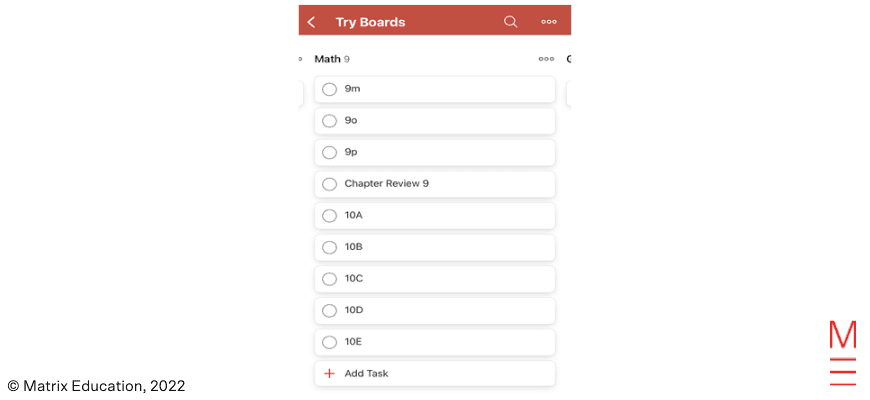
After I write down everything I need to do, I start putting everything into a timetable and allocating the amount of time that I would be spending on each task. I use another app called Timetable; it is so simple to use! Add in the task and the start and finish time. When I go back and check the timetable, it highlights the task I should be up to, to keep on track I ensure to have plenty of breaks after long study sessions.

One of the things that I have found effective is that I have a ‘magic number’ of minutes, in which I feel productive, and work efficiently. My magic number is 45 minutes. It is not too long nor too short and after 45 minutes I have a 15-minute break. As a normal teenager, I do face procrastination. I actually have another app for this! It is called Forest. Whenever I want to stay focused (in this case, study), I set a timer of how long I want to work, and the app plants a tree. The tree grows as I focus on my work, however, if I leave the app and go onto other applications on my phone, the tree dies. No one wants trees to die. Every time a tree is planted, I earn coins and after I earn a certain amount of coins, the foundation of the app plants a real-life tree! Both my inner-environmentalist and productivity is satisfied, while my procrastination is beaten.

Building good habits is essential for an effective study routine! Many students in high school face difficulty in studying and effective learning because proper habits aren’t implemented. There are a few simple strategies that can be used to build good habits and break bad ones!
1. Start with an easy habit
The important part of building a new habit is staying consistent. It doesn’t matter how well it is performed on any individual day. Sustained effort is what makes the real difference. If studying for an hour is hard, study for 15 minutes at first and try to do that every day. It doesn’t matter if it is started small because there will be plenty of time to pick up the intensity later, once the consistency is sustained. This effectively boosts productivity.
2. Know what is the root of the problem
What exactly is stopping you from studying?
Procrastination? Is the content difficult to understand? The people who stick with good habits understand exactly what is holding them back. Instead of making a blanket statement about the habits, break them down into smaller pieces and think about which areas are being prevented from becoming consistent. Once the specific parts of the process that are being held back are found out, a solution can be developed to the problem. When it comes to understanding the content, I have utilised Matrix+ classes. The teachers break down the information effectively and clearly explain the concepts. With the help of matrix theory books and the knowledge of classroom teachers, understanding the content becomes much easier.
Get ahead with Matrix+ Online
Expert teachers, detailed feedback and one-to-one help. Learn at your own pace, wherever you are.
3. Tracking the progress
Tracking the progress of the habit is essential for it to further develop and increase efficiency. Once a habit is started, it has to be able to be built on. Starting with 15 minutes, and increasing it to 30 minutes perhaps. After making that the new habit to practice! Building habits requires a lot of patience and repetition. It is important to track the progress and make sure they are being enacted properly. This can be done by marking the days that the habit was completed, or setting a specific amount of times the habit needs to be done.
While building habits is the best way for successful studying, there are a few more secrets for exam preparation.
Preparation is key to exams! It is vital that the things that need to be done for the exam, are spread out over a period of time. To start off, I do 2 key things:
In my 6 week plans, I spread them out into three parts, with two-week periods:
For maths, English and science, since Matrix teaches one term ahead, I usually have already learnt all the content, which makes it easier to write notes! I find the Matrix theory books very helpful in addition to the textbooks and materials I receive from my teacher when writing summaries in my notes.
I also like to utilise YouTube channels that present different videos on different topics. They are good at breaking down the information and usually use diagrams to explain concepts. One of the things that I also find really helpful is saving different links. Whenever I do research for my different subjects, I make sure to save different links into different folders. This allows me to easily come back to them, so I can revise them for my notes and exams. This is really helpful for English. I have different links for each chapter of the novel I study for that term, that explain things like character development, plot, summaries and analysis of the novel. I also make sure to book workshops with tutors at Matrix, if there are any topics that I may be unsure about. These one on one sessions effectively break down the information so I can understand it.
Over these two weeks, I keep on writing notes on any other information that I may have learnt. I also start to do concept check questions. These questions may be provided in class, textbook questions and the Matrix books. I also make a point to figure out places I need to work on, find my weaknesses and fix them. The Matrix Workbook and Theory Book are excellent places to find concept check questions for specific topics. These two weeks are vital for my understanding and the time I start to take in the information and transfer it to my long-term memory, for the exam.
In the last two weeks before an exam, I find practice tests on the specific exams that are coming up. I usually have a few from my teachers, or I go over review questions in the Matrix Theory Book. In this time, I perfect my time management during the tests and ability to formulate concise and structured responses.
By the end of the 6 weeks, I am prepped and ready to take my exams with full confidence.
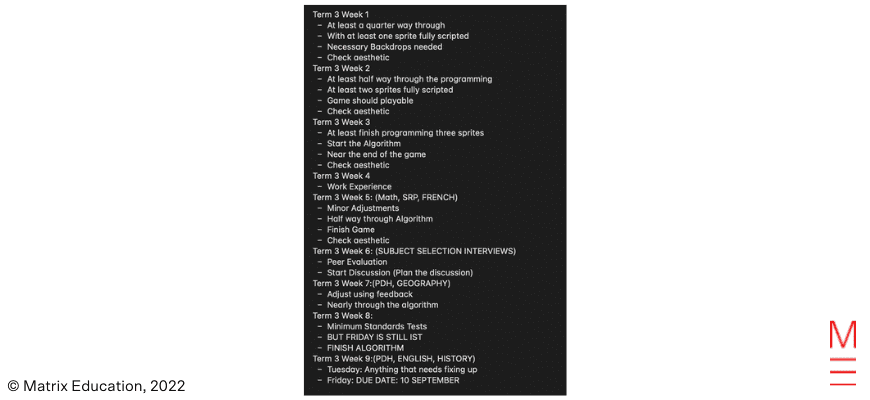
Writing notes can become tiring, with the load of content and restricted time. I have a few strategies to help make the strenuous process much easier:
1. The outline method
I am a very structured person and I personally like to use the outline method. The outline method has the advantage of allowing you to prioritise the material. Key ideas are written on the left side of the page, then subordinate ideas are indented, and details of the subordinate ideas can be indented even further.
The outline method reduces the time needed to edit and review notes which is useful since for exams a lot of information needs to be digested in a short time.
Since it follows a relatively strict framework this method allows you to focus on the subject instead of needing to spend too much time getting your notes right.
2. Annotate information
Being able to extract key ideas is an extremely efficient technique for note-taking and exams. Instead of just reading through a big block of text, highlight, draw lines, arrows, extract deeper meanings and explanations. This reduces the likeliness of just written learning (memorising information without actually understanding), it further exemplifies learning the content. It also makes the information clearer and easier to understand, since extracting it has reduced the complexity.
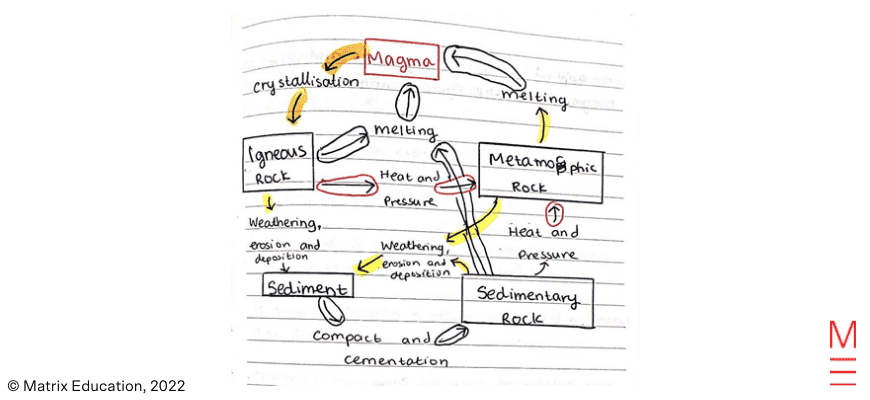
3. Make my own questions to answer
When note-taking, the general questions that I answer are from the syllabus. However, they can be vague, and often I’ve seen that people just end up writing very simple notes on each dot point. That’s why I like making my own questions to answer in my notes. I look at the syllabus dot point, and further expand on the different things I need to write. There may be sub-topics or even just questions of my own which I think are appropriate under the dot-point.
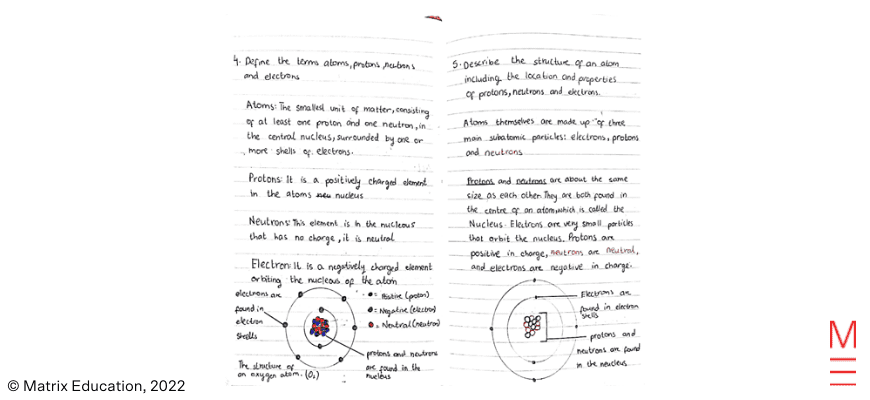
4. Pictures and Diagrams
A picture is a thousand words. Cliché but it’s true. Just writing words and words of text, can become tiring for the brain to read. Including simple diagrams like how different processes work (water cycle, carbon cycle etc), can simplify the information. It is much easier to take in and apply for the exam. Using mind maps can also be another option. I like to make mind-maps, as an end-summary page to my notes, it nicely wraps up and gives me a small, visual representation of everything I wrote.
Life can sometimes get in the way of all this planning and distort the vision a bit. This year was quite a stressful year for me. There were a lot of obstacles to get through, especially with my rising levels of stress. Even with all the preparation, I had a sudden anxiety attack halfway through my maths exam. It was terrifying for me, and extremely frightening. I had set such high expectations for myself, and I was afraid that my stress levels were pulling me down. My maths test was probably the worst test I ever had in my life, I dropped from my 2nd rank in maths and was devastated.
After such setbacks, regaining resilience was my top priority, being able to pull myself out of the deteriorating mindset of my inner critic. I needed to use my failure and continue to build on my success!
I needed to find the root of my problem. How did it all go wrong? I immediately realised I was overworking myself, I wasn’t taking care of myself and needed to manage better ways for self-care. The stress levels from lockdown and the decreased levels of social interactions seriously had a slash on my motivation. I needed to find my self-motivation again.
Self-motivation is very important during failure. So I started looking at Ted-Eds! I found an excellent Ted-Ed that I think might have changed my life.
The technique I use from the Ted Talk (The Psychology of Self Motivation – Scott Geller | TedTalk) is asking myself these three questions:
The presenter said you need to slowly teach yourself to answer yes to all these questions, every time you want to achieve something. I wrote them down on a piece of paper and hung them up on my table. Every time I do a task, I look up at the questions, take a deep breath and say yes three times. It has significantly improved my motivation.
Lastly, it is important to acknowledge the fact that asking for help is okay to do. After lockdown, once I got back to school, I went and talked to the psychologist. She took me through certain exercises to help relieve stress and helped me work out my problems. I also went to my friends, family and wonderful teachers for support and they were all there for me. Sometimes asking for help is the best thing you can do.
I would tell my fellow Year 10 students that to only live through peril and problems can only lead them to stay for perpetuity. I would tell them to accept the change and work through it, and proudly be able to say that they rose from it, leaving them as more capable human beings.
Written by Guest Author
We have regular contributions to our blog from our Tutor Team and high performing Matrix Students. Come back regularly for these guest posts to learn their study hacks and insights!© Matrix Education and www.matrix.edu.au, 2023. Unauthorised use and/or duplication of this material without express and written permission from this site’s author and/or owner is strictly prohibited. Excerpts and links may be used, provided that full and clear credit is given to Matrix Education and www.matrix.edu.au with appropriate and specific direction to the original content.